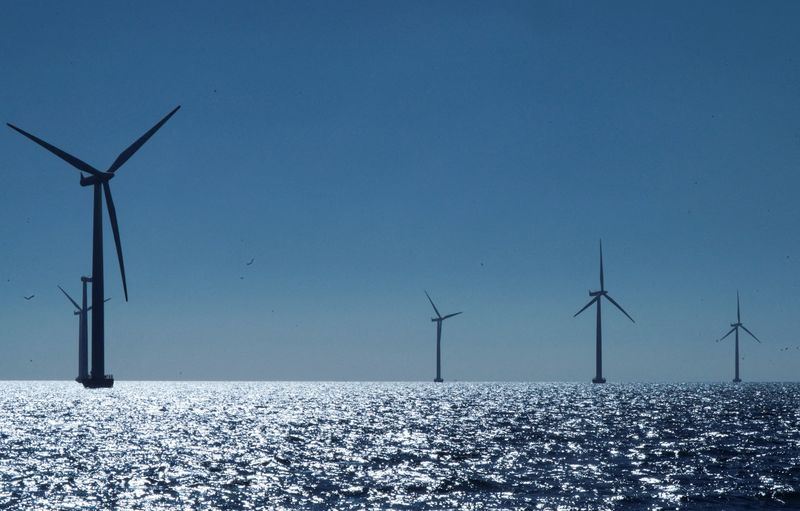By Christoph Steitz, Stine Jacobsen and Jacob Gronholt-Pedersen
FRANKFURT/COPENHAGEN (Reuters) -The world's three biggest wind power groups - Siemens Energy, Orsted (CSE:ORSTED) and Vestas - on Wednesday gave a sober view of the year ahead for an industry buffeted by project delays, equipment problems and inflation.
Siemens Energy, the world's largest maker of offshore wind turbines, expects a 2024 loss before special items of around 2 billion euros ($2.2 billion) at Siemens Gamesa. The wind division has had to deal with the cost of addressing quality problems affecting some onshore models.
Siemens Energy CEO Christian Bruch said the overall energy sector had strong fundamentals, but "one still has to note that ... the speed at which grids and renewables are expanding is still not sufficient".
He said the current expansion, most of which is happening in China, put the world on track to increase global renewable capacity two-and-a-half-fold by 2030, below the three-fold target agreed at last year's COP28 climate summit in Dubai.
In addition, rising prices for raw materials and components as well as regulatory delays have caused writedowns and losses across the wind industry despite robust demand for renewable technology. Turbine makers have been particularly hit.
"You see the terms and conditions of the projects being too difficult for investors and project developers to take. So we are in a standstill," said Danny van Doesburg, senior portfolio manager at Dutch APG Asset Management, which according to LSEG data owns stakes in Vestas, Orsted and Siemens Energy.
"The market is not functioning anymore," he added, calling for a stronger role for governments to help deliver a functioning market model that distributes profits throughout the value chain.
'NO FREE GIFTS'
Anders Schelde, chief investment officer at Danish fund Akademikerpension, also said market conditions in offshore wind needed to be reset to make the sector profitable again.
Vestas, the world's top maker of wind turbines, swung to a fourth-quarter profit, but said it would not pay a dividend for 2023, and its CEO Henrik Andersen said challenges would continue to weigh on the sector this year.
"We love our clients ... but none of our shareholder wants us to hand out free gifts," he told Reuters, adding the company was working closely with developers and governments to ensure a fair split.
Shares in Siemens Energy and Vestas were up 1.3% and 6.7% respectively, while those in Orsted, the world's biggest offshore wind project developer, fell 1.8% in the wake of its capital markets day.
Orsted announced a portfolio review as well as job cuts following major writedowns on delayed U.S. projects.
The Danish group said it aimed to reduce fixed costs by 1 billion Danish crowns ($144 million) by 2026, which would include 600-800 job cuts globally, flagging around 250 redundancies in 2024 as part of the review.
"In order to improve our competitiveness, ensure value creation, and ensure our ability to attract capital to the renewable build-out, we will make Orsted a leaner and more efficient company," CEO Mads Nipper said.
Norwegian oil and gas group Equinor said it remained committed to offshore wind and other renewables despite lower returns, in line with its long-term plan to diversify its income.

($1 = 0.9288 euros)
($1 = 6.9260 Danish crowns)